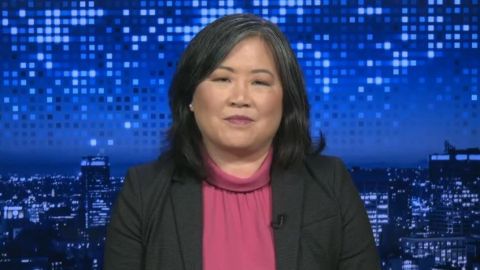Read Transcript EXPAND
CHRISTIANE AMANPOUR: So, can we first, Cecillia, welcome to the program, take that constitutional point that Kris Kobach was making, that it is not unusual in advanced democracies, including the United Kingdom, to ask a citizenship question in order to vote and for other administrative reasons.
CECILLIA WANG, ACLU DEPUTY LEGAL DIRECTOR: Well, Christiane, on this subject, the Supreme Court of the United States has spoken and they ruled against President Trump’s decision through Secretary of Commerce, Wilbur Ross, to add a question about citizenship to the United States census. It’s actually not true that we’ve been asking about citizenship in the census since time in memorial as Kris Kobach falsely said. The United States hasn’t asked the question for decades in the census because it was proven by the Census Bureau’s data scientists themselves that asking the question on the official decennial census would in fact suppress the count of all people living in the United States and disproportionately would affect Latino-Americans and other people of color. So, the Supreme Court said, and ruled officially, that the decision by the Trump administration to add that question was based on a pretextual false reason that they wanted to support the Voting Rights Act and that, in fact, that was not the true reason and they have sent the case back. And as you know, President Trump finally backed down and said, “We’re going to go ahead and print the census questionnaire without this question.”
AMANPOUR: Right. Yes. And I did put that to Kris Kobach as well. Now, I think you, the ACLU, brought this case. I mean, you are the ones who brought this case to the Supreme Court and blocked that for the moment. But you mentioned about some of the issues and I wanted to read this to Kris Kobach, I didn’t have quite enough time, about all of this. You know, it now comes to light that the sort of the intellectual god father of this citizenship census question precisely wanted that because he knew it would help Republicans. The White House had claimed that it wanted this information because it was enforced civil rights. But here is what Thomas B. Hofeller who is now deceased and a Republican strategist said, he argued that new proposed voting maps for Texas would “be advantageous” to Republicans and non-Hispanic Whites. I would assume you agree with the premise, which is why you’re trying to block it. But the question I was trying to ask Kris Kobach and now I want to ask you is, what kind of influence nationwide do these attempts have, whether they’re blocked or not?
WANG: Well, Christiane, I think that the sad truth is that President Trump’s policies, many of which, as you said, Kris Kobach has masterminded, are inflicting enormous damage on American communities. They’re divisive. They’re trying to take the United States back to a pre-civil rights era time when we didn’t have civil rights protections, when we had explicit quotas that were intended to maintain a certain racial mix in the United States. And now, with President Trump’s half dozen anti-asylum measures, including yesterday’s announcement about a rule that would basically block asylum claims at the U.S./Mexico border from people of all nationalities who are seeking refuge from persecution in the United States, all of these policies are trying to take us backward. In the case of the asylum policies, pre- World War II era policies where the civilized nations of the world did not recognize that we have an obligation as receiving countries to take people who are fleeing from persecution. And I think the thing that Kris Kobach and President Trump and there alike are really missing is that people who come to the United States as refugees or as immigrants are future Americans and contribute to the richness of our country, our diversities, our strength. And I think that the majority of Americans believe that and understand it. And I think that’s why ultimately their policies will fail. We watched Mr. Kobach through many of his past policies on both immigration and the voting rights of U.S. citizens, they’ve damaged American communities, but ultimately, were ruled illegal and unconstitutional or contrary to laws passed by Congress.
AMANPOUR: Well —
WANG: In the meantime, they’re inflicting great pain on American communities. And especially, these days, on American children who look at what President Trump tweeted at our four members of Congress, all women of color, saying, “Go back where you came from.” We all know exactly what that means. All of us, people of color, in the United States have known since childhood what “go back where you come from means.” And that’s hurting people in our country. But, ultimately, I think his policies will fail and we’ will prevail in challenging them in court and ultimately, in winning over the vast majority of American people who believe in diversity, who believe in a fair immigration policies and who believe in the right to vote and to be counted.
AMANPOUR: Well, this is the case, though, I also made to Kris Kobach, that — and I introduced this program with it, that clearly it seems that President Trump is doubling down on identity politics as a defining issue for his re-election campaign. I know you’re monitoring this asylum policy and you’re legally challenging it, but they must believe despite the, you know, unprecedented nature of it, in both U.S. and international law, that there must be a loophole like the attorney general said in an official statement just last week or this week, “The rule is a lawful exercise of authority provided by Congress to restrict eligibility for asylum. The U.S. is a generous country but it’s been completely overwhelmed by the burdens associated of apprehending and processing hundreds of thousands of aliens along the southern border.” Is there a loophole? How confident are you of what you say that this will be knocked down?
WANG: Well, we are very confident that like all of his prevention anti- asylum policies, including the use of immigration jails to deter asylum seekers unilaterally trying to change the asylum standards that have been established by the Board of Immigration Appeals in the United States. Family separation, tearing — literally tearing babies out of their parents arms simply for coming to the United States. To use their right under U.S. law and international law to seek asylum. All of those policies we have successfully challenged in the U.S. courts.
AMANPOUR: OK. All right.
WANG: And I think that the question you’re posing is a good one. I think, ultimately, in addition to the courts striking down these policies and laws put out there by the Trump administration, we’re going to see the proof is in the pudding, the American people don’t want to go backwards to pre-civil rights era.
About This Episode EXPAND
Christiane Amanpour speaks with Kris Kobach and Cecillia Wang about Trump’s racist tweets. Steven M. Gillon and Carole Radziwill join the program to discuss the 20th anniversary of John F. Kennedy Jr’s death. Rujeko Hockley sits down with Alicia Menendez to discuss the Whitney Biennial 2019.
LEARN MORE



